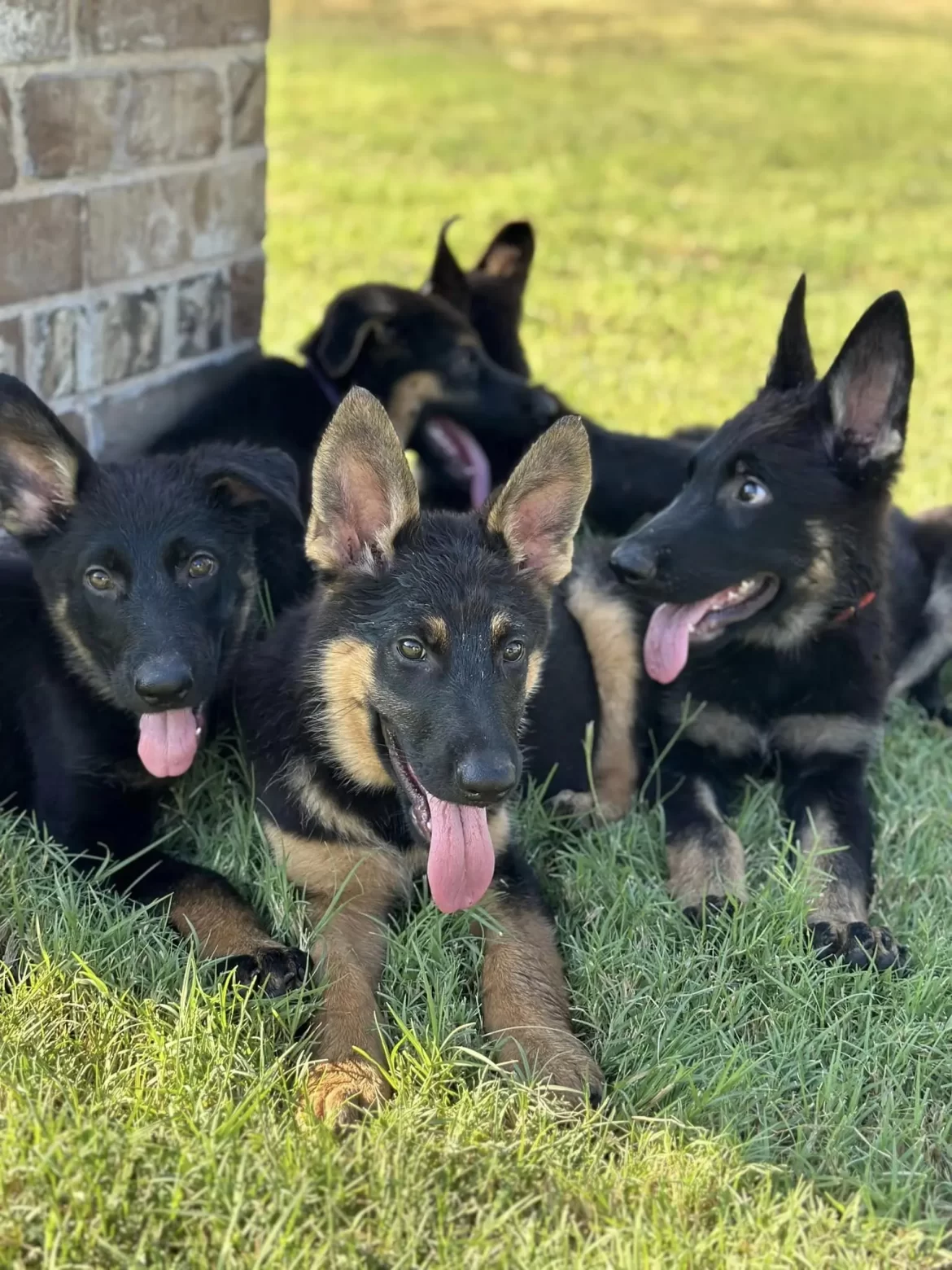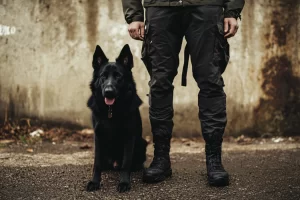Effective Obedience Training of Domineering older German Shepherd Puppies
Ineffective obedience training is a critical factor contributing to dominance issues in maturing dogs. Understanding canine behavior and pack dynamics clarifies how improper training can impede a dog’s respect for its owner, leading to challenges with dominance. Effective obedience training of your German Shepherd puppies must encompass several stages, each crucial to fostering a balanced and respectful dog.
Stages of Effective Obedience Training with Agressive Older German Shepherd Puppies
Step One: The Introductory Learning Phase
The initial phase involves teaching the dog the meaning of commands in a distraction-free environment, such as the kitchen. Utilizing motivational methods, the trainer guides the dog through exercises, rewarding compliance with food or toys. It’s vital to identify the most effective motivator for each individual dog, ensuring responsive and eager participation.
Step Two: The Normalization Phase
Once the dog grasps the command in its initial setting, the next step is to generalize this behavior. This means teaching the dog to perform the learned behavior across various environments and amidst increasing distractions. The goal is to ensure that the dog consistently responds to commands regardless of external stimuli.
Step Three: The Correction Phase
In this phase, the dog learns that non-compliance with a known command leads to correction. Importantly, corrections are only applied if the trainer is confident the dog comprehends the command. Consistency in this phase is critical to achieving reliable behavior. Corrections may vary from withholding rewards to physical corrections, depending on the dog’s needs and temperament.
The Importance of the Correction Phase
Many obedience classes effectively cover the learning phase but often omit the correction phase, especially in large pet store programs. While many trainers rightly contend that German Shepherd puppies should not receive physical corrections, mature dogs require this phase to understand the consequences of non-compliance. Omitting this step can lead to dominant behavior as the dog matures, believing it can disregard commands without repercussions.
Understanding Canine Pack Dynamics
In a wolf pack, members must obey the alpha wolf or face survival consequences. Similarly, a dog that disrespects its owner’s commands essentially questions their authority. This lack of respect can escalate to dominance issues, where the dog challenges its owner or family members. Without consistent corrections, a dog may learn it can ignore commands it dislikes, potentially leading to aggressive behaviors such as growling, nipping, or resource guarding. Ensuring consistent and memorable corrections teaches the dog to respect the handler. A dog that respects the handler is less likely to challenge commands and more likely to exhibit obedient behavior.
Addressing Dominance in older German Shepherd Puppies
For owners confronting dominance in mature dogs, the solution is not heightened physical corrections but controlling the dog’s environment. By managing the dog’s living conditions and limiting scenarios that can trigger dominance, owners can re-establish control.
Managing Your German Shepherd Puppies Environment
Your German Shepherd Puppies Sleeping Arrangements
Dominant dogs should not sleep in the owner’s bedroom. The prime sleeping location should be reserved for the pack leader. Crating the dog in a different room reinforces this hierarchy. Although initial crate training might involve acclimating the puppy to the owner’s bedroom for adjustment, the crate should soon be moved.
Getting Your German Shepherd Puppies Toys Ownership Right
Toys should be viewed as the owner’s property, not the dog’s. Allowing a dog to become possessive of toys can fuel dominance. All toys should be introduced and removed by the owner, establishing control and ownership.
Feeding Protocols for Your German Shepherd Puppies
Dominant dogs should not be present during family meals and should never be fed from the table. Feeding the dog separately or in a crate prevents dominance issues related to food. Additionally, consistent feeding schedules and controlled access to food reinforce the owner’s authority.
Addressing Aggression Around Food
Aggression around the food bowl can be mitigated by feeding the dog in a crate or isolated area. Consistency in feeding routines fosters trust and diminishes unnecessary aggression. While some trainers advocate for removing food bowls to assert dominance, this method can create unnecessary anxiety. Instead, fostering a dependable routine ensures the dog views the owner as a provider rather than a threat.
Appropriate Praise and Reward for Your German Shepherd Puppy
Building a strong bond with a dominant dog involves controlled interactions. Petting and praise should be on the owner’s terms, not at the dog’s demand. Reinforcing commands before offering affection reinforces obedience and respect.
Setting Boundaries at Doors and Stairs
Teaching a dog to wait at doors and stairs is less about dominance and more about safety and manners. Commands such as “wait” can prevent accidents and assert the owner’s control in various situations. Using tools like prong collars or draglines can aid in teaching these commands without causing stress or resentment.
Handling Agression Towards Visitors
Dogs that display aggression towards visitors are asserting dominance. Isolating such dogs during visits prevents aggressive incidents and reinforces the owner’s control. Consistent management of the dog’s environment during these interactions establishes the owner’s authority.
Learning to Avoid Dog-to-Dog Aggression
Dogs with dominance issues should not interact with unfamiliar dogs, especially in unregulated environments like dog parks. Professional guidance may be necessary for cases of severe leash aggression. Resources like articles and videos on handling dog aggression can provide valuable insights and strategies.
Think Twice Before Trying Alpha Rolls With Your Dominant Older German Shepherd Puppy
What is an Alpha Roll
An alpha roll is a controversial dog training technique that involves forcibly flipping a dog onto its back and holding it in a submissive position, often described as pinning the dog to the ground. The concept is based on outdated theories of dominance and submission within canine social structures, where it is believed that this action mimics the natural behavior of dominant wolves asserting control over subordinate pack members. The handler performs an alpha roll intending to establish authority and assert dominance over the dog.
However, contemporary animal behaviorists and veterinary experts widely criticize this technique due to its potential to cause physical harm and psychological stress to the dog. The alpha roll can provoke fear, anxiety, and even aggression, particularly in dogs that do not respond well to physical force. Rather than fostering trust and respect, this method can damage the dog-owner relationship and lead to further behavioral issues. Modern dog training emphasizes positive reinforcement, consistency, and clear communication, focusing on building a cooperative and trusting bond between the dog and the handler. The alpha roll is considered outdated and risky, and is generally discouraged in contemporary dog training practices.
Alpha rolls, popularized by certain TV trainers, involve forcibly subduing a dog to assert dominance. This method is dangerous and should be avoided. It often results in physical injury to the handler and exacerbates the dog’s aggressive tendencies. Effective dominance management relies on controlled, non-confrontational methods that emphasize leadership and respect, not physical force.
Consistent Leadership While Training Your German Shepherd Puppy
Creating a strong and respectful relationship with a dominant dog involves consistent, thoughtful management, not brute force. Handlers must use strategic, non-confrontational methods to assert control, such as engagement training. Consistently controlling the dog’s environment and interactions fosters respect and reduces dominance behaviors. Whatever the task at hand, whether potty training an older German Shepherd puppy or coming to terms with a dominant dog, consistent leadership is key.
Conclusion
Dominance issues in dogs can often be traced back to inadequate obedience training. By emphasizing consistent training methods and comprehensive correction phases, handlers can mitigate these issues. Managing a dog’s environment and interactions through structured routines and consistent reinforcement establishes the handler as the pack leader. Ultimately, effective training and management lead to a more harmonious relationship, fostering obedience and reducing dominance-related problems. For advanced strategies on training your German Shepherd puppy, consider reading other articles at Czech Working Line. New articles are regularly updated. We hope you find these useful.




